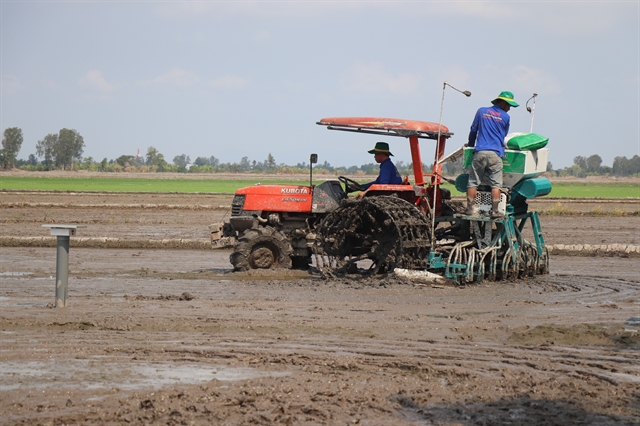 Society
Society

 |
| Once the model proves successful, it will be replicated in all of Thuận Tiến Cooperative's 512 hectares and other localities. — VNA/VNS Photo Thu Hiền |
CẦN THƠ — A pilot model of high-quality, low-emission rice production was launched in Thạnh An Commune, Vĩnh Thạnh District, the Mekong Delta city of Cần Thơ on Friday, opening a project aiming to expand this model to one million hectares across the Mekong Delta by 2030.
The launching ceremony saw the attendance of representatives from the Ministry of Agriculture and Rural Development (MARD), the 12 Mekong Delta localities participating in the project, and international organisations, as well as farmers and experts.
The 50-hectare model will apply sustainable farming techniques at Thuận Tiến Cooperative in Thạnh An Commune.
Director of Thuận Tiến Cooperative Nguyễn Cao Khải said once the model proves successful, it will be replicated in all of the cooperative’s 512 hectares, and other localities.
Deputy Director of the municipal Department of Agriculture and Rural Development Trần Thái Nghiêm said farmers and the local agricultural sector share the hope that cutting-edge farming methods will soon be put in place in Cần Thơ, contributing to raising rice quality and cutting emissions from cultivation.
Rice output in the Mekong Delta, dubbed the nation's rice granary, has remained stable at 24-25 million tonnes per year, accounting for more than half of the country’s total amount and 90 per cent of its rice exports.
The same day, the MARD launched five demonstration sites on high-quality, low-carbon rice cultivation to train local farmers.
The project has received support from many international organisations and businesses such as the World Bank and the International Rice Research Institute.
IRRI Deputy Director General Joanna Kane-Potaka expressed her hope that through the pilot model, farmers can learn from the experience of experts and partners in low-carbon rice cultivation. — VNS




